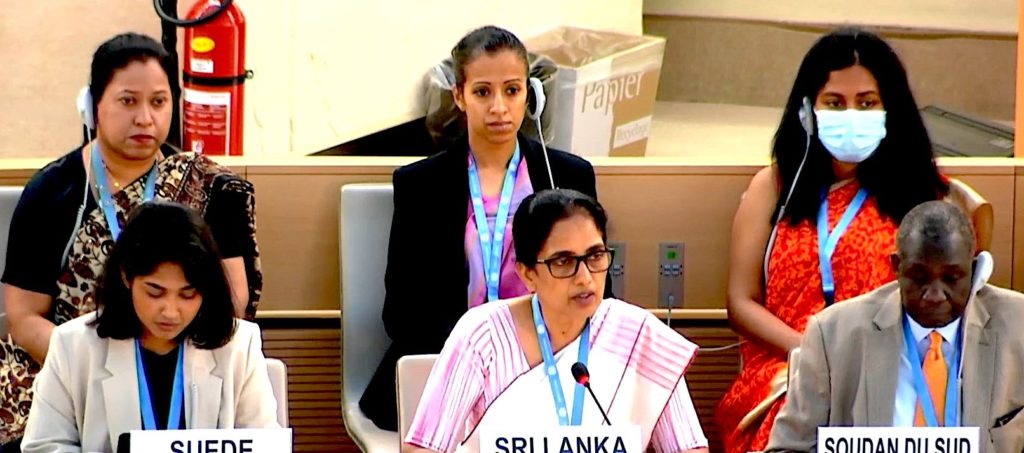Photo courtesy of Newswire
On the opening day of the 54th session of the UN Human Rights Council (HRC) on September 11, member states were considering yet another report detailing abuses by the Sri Lankan regime.
“One year after the remarkable protest movement demanding deep political and democratic reforms, the transformation that was hoped for to address long-standing challenges has still not materialised,” United Nations Deputy High Commissioner Nada Al-Nashif said. “Accountability is central to secure Sri Lanka’s present and future.”
Predictably, during the interactive dialogue which began immediately afterwards and continued after a break, the government was dismissive, although the issues raised echoed the concerns of numerous Sri Lankans and the evidence of rights violations was extensive.
Verité Research reported that by the end of August, the government had fulfilled only 19.4% of the 36 practical commitments in HRC Resolution 30/1 co-sponsored by Sri Lanka and adopted in October 2015. These fell into five broad categories: rights and rule of law (15 commitments), transitional justice and reconciliation (9), security and demilitarisation (7), international engagement (3) and power sharing (2). There had been “poor” or “no” progress on 61.1% of the commitments after eight years.
Willingness to take action to advance human rights had been confirmed in later resolutions 34/1 in 2017 and 40/1 in 2019, again co-sponsored by the Sri Lankan state. In February 2020, the government withdrew from co-sponsorship of these HRC resolutions. Those in charge have continued to fend off scrutiny by the HRC; supposedly they care deeply about the rights and freedoms of Sri Lankans and do not need any international bodies to tell them what to do. If that were truly the case, those past problems would have mainly gone away but instead most remain and, in certain regards, matters have become worse.
Strong criticism and weak excuses
Nada Al-Nashif outlined key points from the highly critical report by the High Commissioner for Human Rights, Volker Türk, painting a sombre picture of the many ways in which ordinary Sri Lankans had been let down yet again by those wielding power over them.
Those failed by national leaders include people facing poverty, those wishing to exercise their right to vote in delayed local elections and wanting basic freedoms such as the right to protest, ethnic and religious minorities whose security and dignity is being further undermined, victims of war and their families still waiting for justice or at least answers and often targeted for harassment as well as those wanting the truth about the 2019Easter Sunday bombings.
In reply, Himalee Arunatilaka, Ambassador and Permanent Representative of Sri Lanka, offered an implausibly rosy portrayal of the situation of the island’s people under the current government. Supposedly economic, social and financial stabilisation, with democratic resilience, had been achieved and tangible progress was being made on human rights. According to her, outside interference was unwarranted (other than, presumably, those forms which might serve the regime’s interests).
A few other states were on the regime’s side including the Philippines, Cuba, Pakistan and China. They took issue with what they saw as unjust attempts to impose accountability from outside. But many HRC members were critical, while seeking to be constructive and couching their criticisms in suitably diplomatic language. These included the government of the UK on its own behalf referring to the uncovering of yet another mass grave and on behalf of the Core Group tasked with examining the Sri Lankan situation. In the view of India’s leadership, not enough progress had been made towards fulfilling the aspirations of Tamils for equality and dignity. The government of Aotearoa New Zealand mentioned that elections were overdue.
Non-governmental organisations too helped to give voice to the fears and sorrows of the numerous Sri Lankans who had been marginalised or victimised by those in charge. These included the International Commission of Jurists and the International Federation for Human Rights. “The High Commissioner’s report gives a glimpse behind the façade put up to cover the deepening impunity, systematic repression of dissent, continuing violations of in war affected regions and communities, and deepening economic inequality in the country,” the Asian Forum for Human Rights and Development declared. “In absence of any possibility of accountability through domestic mechanisms, the Council remains an important avenue of hope of justice for the tens of thousands of victims of past atrocities and of successive governments.”
Also on September 11, the Committee on Enforced Disappearances opened its 25th session. Again, Sri Lanka was one of the countries of concern.
Wide coverage of further allegations relating to the 2019 Easter Sunday terror has added to the government’s woes. On September 13, the ambassador claimed that adequate measures were being taken to establish the truth although it is unlikely that many people really believe that the current leadership would be willing to take on the Rajapaksas, who continue to wield considerable power.
Time and again, the regime’s promises of genuine change have proved hollow. Rhetoric and impressive sounding initiatives have come up against harsh reality as large numbers of Sri Lankans continue to face unnecessary suffering with no immediate prospect of an end to human rights abuses.
